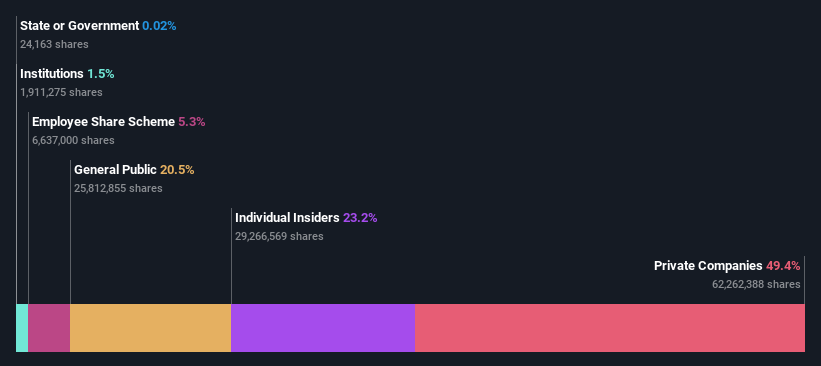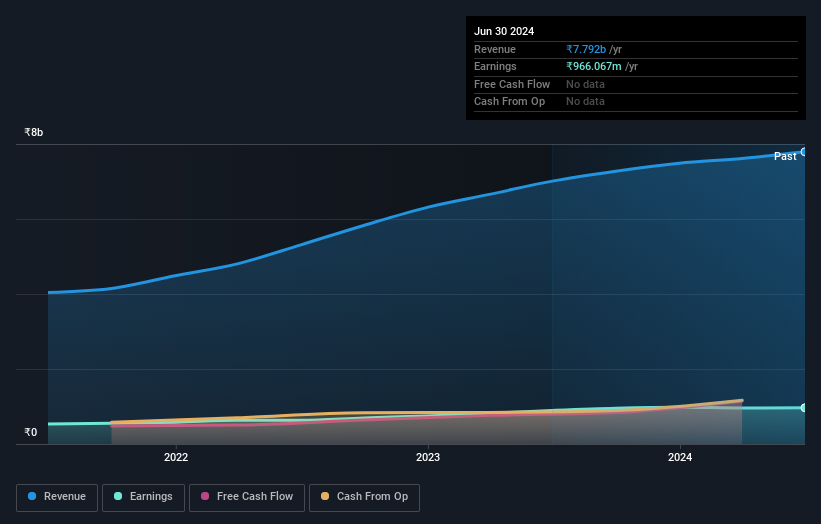Saksoft Limited's (NSE:SAKSOFT) stock price dropped 11% last week; private companies would not be happy
Key Insights
- Significant control over Saksoft by private companies implies that the general public has more power to influence management and governance-related decisions
- A total of 2 investors have a majority stake in the company with 71% ownership
- Insider ownership in Saksoft is 23%
If you want to know who really controls Saksoft Limited (NSE:SAKSOFT), then you'll have to look at the makeup of its share registry. And the group that holds the biggest piece of the pie are private companies with 49% ownership. In other words, the group stands to gain the most (or lose the most) from their investment into the company.
While insiders who own 23% came under pressure after market cap dropped to ₹32b last week,private companies took the most losses.
Let's delve deeper into each type of owner of Saksoft, beginning with the chart below.
Check out our latest analysis for Saksoft

What Does The Institutional Ownership Tell Us About Saksoft?
Institutions typically measure themselves against a benchmark when reporting to their own investors, so they often become more enthusiastic about a stock once it's included in a major index. We would expect most companies to have some institutions on the register, especially if they are growing.
Since institutions own only a small portion of Saksoft, many may not have spent much time considering the stock. But it's clear that some have; and they liked it enough to buy in. So if the company itself can improve over time, we may well see more institutional buyers in the future. When multiple institutional investors want to buy shares, we often see a rising share price. The past revenue trajectory (shown below) can be an indication of future growth, but there are no guarantees.

Hedge funds don't have many shares in Saksoft. Our data shows that SAK Industries Ltd. is the largest shareholder with 49% of shares outstanding. With 22% and 5.3% of the shares outstanding respectively, Aditya Krishna and Saksoft Ltd., ESOP are the second and third largest shareholders. Aditya Krishna, who is the second-largest shareholder, also happens to hold the title of Chief Executive Officer.
To make our study more interesting, we found that the top 2 shareholders have a majority ownership in the company, meaning that they are powerful enough to influence the decisions of the company.
Researching institutional ownership is a good way to gauge and filter a stock's expected performance. The same can be achieved by studying analyst sentiments. Our information suggests that there isn't any analyst coverage of the stock, so it is probably little known.
Insider Ownership Of Saksoft
The definition of company insiders can be subjective and does vary between jurisdictions. Our data reflects individual insiders, capturing board members at the very least. The company management answer to the board and the latter should represent the interests of shareholders. Notably, sometimes top-level managers are on the board themselves.
I generally consider insider ownership to be a good thing. However, on some occasions it makes it more difficult for other shareholders to hold the board accountable for decisions.
Our most recent data indicates that insiders own a reasonable proportion of Saksoft Limited. Insiders have a ₹7.3b stake in this ₹32b business. We would say this shows alignment with shareholders, but it is worth noting that the company is still quite small; some insiders may have founded the business. You can click here to see if those insiders have been buying or selling.
General Public Ownership
With a 21% ownership, the general public, mostly comprising of individual investors, have some degree of sway over Saksoft. While this size of ownership may not be enough to sway a policy decision in their favour, they can still make a collective impact on company policies.
Private Company Ownership
Our data indicates that Private Companies hold 49%, of the company's shares. It might be worth looking deeper into this. If related parties, such as insiders, have an interest in one of these private companies, that should be disclosed in the annual report. Private companies may also have a strategic interest in the company.
Next Steps:
I find it very interesting to look at who exactly owns a company. But to truly gain insight, we need to consider other information, too. For instance, we've identified 1 warning sign for Saksoft that you should be aware of.
Of course, you might find a fantastic investment by looking elsewhere. So take a peek at this free list of interesting companies.
NB: Figures in this article are calculated using data from the last twelve months, which refer to the 12-month period ending on the last date of the month the financial statement is dated. This may not be consistent with full year annual report figures.
New: Manage All Your Stock Portfolios in One Place
We've created the ultimate portfolio companion for stock investors, and it's free.
• Connect an unlimited number of Portfolios and see your total in one currency
• Be alerted to new Warning Signs or Risks via email or mobile
• Track the Fair Value of your stocks
Have feedback on this article? Concerned about the content? Get in touch with us directly. Alternatively, email editorial-team (at) simplywallst.com.
This article by Simply Wall St is general in nature. We provide commentary based on historical data and analyst forecasts only using an unbiased methodology and our articles are not intended to be financial advice. It does not constitute a recommendation to buy or sell any stock, and does not take account of your objectives, or your financial situation. We aim to bring you long-term focused analysis driven by fundamental data. Note that our analysis may not factor in the latest price-sensitive company announcements or qualitative material. Simply Wall St has no position in any stocks mentioned.
About NSEI:SAKSOFT
Saksoft
An information technology company, provides digital transformation solutions in Europe, the United States, the Asia Pacific, and internationally.
Flawless balance sheet established dividend payer.
Market Insights
Community Narratives



